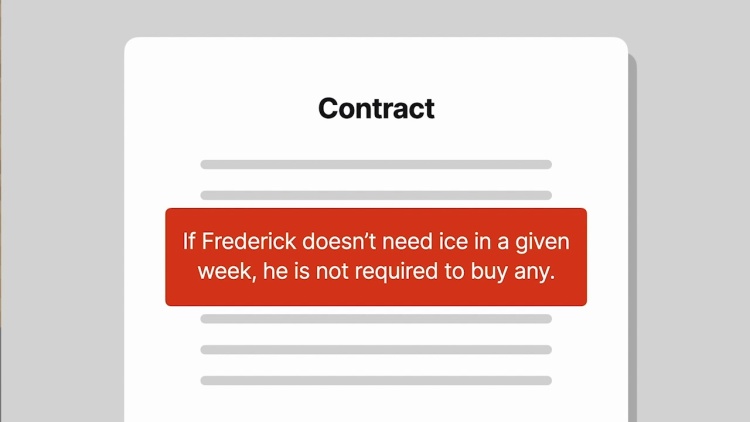Crane Ice Cream Co. v. Terminal Freezing & Heating Co.
Court of Appeals of Maryland
128 A. 280 (1925)
- Written by Megan Petersen, JD
Facts
Frederick owned an ice cream plant in Baltimore, Maryland. Frederick entered into a contract with Terminal Freezing & Heating Co. (Terminal) (defendant) to supply all the ice Frederick might require in his business, up to 250 tons per week. The contract between Frederick and Terminal was based on a long-term personal relationship between the parties. Under the terms of the contract, Frederick was not required to take any ice produced by Terminal in a given week. Frederick maintained a good relationship with Terminal, however, by consistently using roughly the same amount of ice per week and solely ordering all the ice he required from Terminal. Thus, Frederick’s personal integrity and fidelity were key inducements for Terminal to maintain the contract relationship with Frederick. When Frederick retired, he sold his ice cream plant to Crane Ice Cream Co. (Crane) (plaintiff), a large ice cream company with plants in both Philadelphia, Pennsylvania and Baltimore, Maryland. Without informing Terminal or obtaining Terminal’s consent, Frederick assigned all of his rights and obligations under his contract with Terminal to Crane. When Terminal learned of the assignment, it objected and refused to deliver any ice to Crane. Crane brought suit in Maryland state court seeking to enforce the assignment agreement effected by Frederick of his rights and obligations in the contract with Terminal. The trial court entered judgment for Terminal, and Crane appealed.
Rule of Law
Issue
Holding and Reasoning (Parke, J.)
What to do next…
Here's why 907,000 law students have relied on our case briefs:
- Written by law professors and practitioners, not other law students. 47,100 briefs, keyed to 996 casebooks. Top-notch customer support.
- The right amount of information, includes the facts, issues, rule of law, holding and reasoning, and any concurrences and dissents.
- Access in your classes, works on your mobile and tablet. Massive library of related video lessons and high quality multiple-choice questions.
- Easy to use, uniform format for every case brief. Written in plain English, not in legalese. Our briefs summarize and simplify; they don’t just repeat the court’s language.





